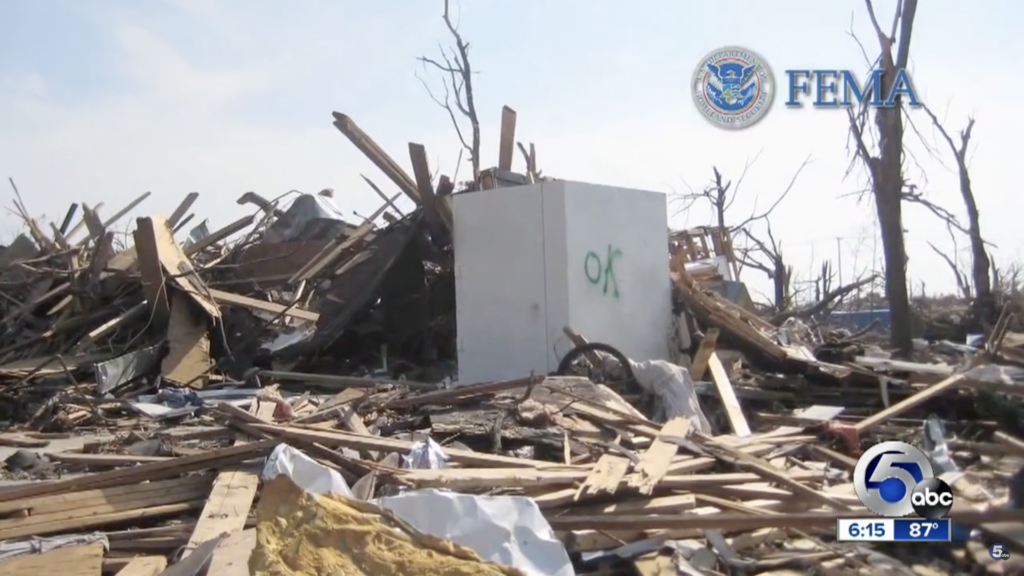
I am looking at a still from an ABC news story about tornados that ravaged a region of the country a few years ago. The image is startling but, sadly, all-too familiar: trees stripped bare, splintered lumber piled haphazardly on the foundation where a house used to be, insulation, debris, devastation, and, as often happens, a beautiful blue sky in the aftermath.

The tornado came. The tornado destroyed. The tornado left.
It is a picture of devastation.
But, in this picture, there is something else. There, right in the middle, stands a large, steel box. It is, in fact, a storm shelter, anchored into the foundation. And it is standing. The debris is literally piled around it and, on one side, upon it. But the shelter remains. And, most importantly, the family that hid in that shelter also remains. It saved their lives.
The image looks like everything in the world had been violently shaken, but the shelter could withstand it.
The shelter was a safe refuge.
The shelter could not be shaken.
The writer of Hebrews will use imagery similar to this when he says something most fascinating about the Kingdom of God.
When God moves in power or in wrath, the earth shakes!
There is a curious and wonderful and frightening image that recurs in scripture time and again. It is the picture of the earth quaking and shaking when God moves or speaks in sovereign power.
You can see this in Judges 5, for instance, where we read:
4 “Lord, when you went out from Seir, when you marched from the region of Edom, the earth trembled and the heavens dropped, yes, the clouds dropped water. 5 The mountains quaked before the Lord, even Sinai before the Lord, the God of Israel.
In Psalm 114, the earth is called upon to tremble before the Lord. There is an expectation of quaking before the Lord!
7 Tremble, O earth, at the presence of the Lord, at the presence of the God of Jacob
Similarly, in Psalm 68, the earth quakes when the Lord marches.
7 O God, when you went out before your people, when you marched through the wilderness, Selah 8 the earth quaked, the heavens poured down rain, before God, the One of Sinai, before God, the God of Israel.
That reference to Sinai in Psalm 68 is significant. It was on Sinai that Moses met with God and it was on Sinai that Moses received the ten commandments. In Exodus 19, we read:
18 Mount Sinai was covered with smoke, because the Lord descended on it in fire. The smoke billowed up from it like smoke from a furnace, and the whole mountain trembled violently.
Over and over again in scripture we find that mighty movements of God are accompanied by a shaking of the earth!
And the day is coming when there will be a final, cosmic, destructive, divine shaking!
Now we come to the fascinating statement by the writer of Hebrews. Recall how, in Exodus 19, Sinai shook when God descended to meet with Moses. The writer of Hebrews references Exodus 19 in Hebrews 12. And his argument is amazing! Watch:
18 For you have not come to what may be touched, a blazing fire and darkness and gloom and a tempest 19 and the sound of a trumpet and a voice whose words made the hearers beg that no further messages be spoken to them. 20 For they could not endure the order that was given, “If even a beast touches the mountain, it shall be stoned.” 21 Indeed, so terrifying was the sight that Moses said, “I tremble with fear.”
Ok, so the writer of Hebrews is taking us back to Exodus 19, to Mount Sinai, to God’s visit with Moses, to the shaking of the mountain! But the writer of Hebrews is talking to us, to followers of Jesus, to the church. And he says that our situation is not like that of Israel at the foot of Sinai in Exodus 19. Rather, he pivots and contrasts the position of believers in Jesus with the position of those who stood before Sinai. He writes:
22 But you have come to Mount Zion and to the city of the living God, the heavenly Jerusalem, and to innumerable angels in festal gathering, 23 and to the assembly of the firstborn who are enrolled in heaven, and to God, the judge of all, and to the spirits of the righteous made perfect, 24 and to Jesus, the mediator of a new covenant, and to the sprinkled blood that speaks a better word than the blood of Abel.
So, the writer of Hebrews has now contrasted the realities of the Kingdom of God—the heavenly Jerusalem, angels, those who are enrolled in heaven, God, Jesus, the blood of Christ—with the experience of Israel when Moses received the Law. Now, the writer of Hebrews is going to argue that what is at stake with humanity and Jesus is even greater than what was at stake at Sinai. Watch again:
25 See that you do not refuse him who is speaking. For if they did not escape when they refused him who warned them on earth, much less will we escape if we reject him who warns from heaven. 26 At that time his voice shook the earth, but now he has promised, “Yet once more I will shake not only the earth but also the heavens.” 27 This phrase, “Yet once more,” indicates the removal of things that are shaken—that is, things that have been made—in order that the things that cannot be shaken may remain.
Ah! Just as Jesus is a greater Moses and just as Calvary is a greater Sinai, so the shaking that will come when Christ returns in power will be greater than the shaking that happened when Moses met God and received the law on Sinai! Moses and the mountain and the earthquake were all types of greater things to come!
A greater storm is coming, but a great Savior has come!
But let us be clear: a greater storm is coming, and the heavens and the earth will be shaken to devastation.
I was happy to see the trailer for the forthcoming biopic on Bob Dylan starring Timothée Chalamet. I was especially happy to see that the trailer featured Chalamet as Bob Dylan singing my favorite Dylan song: “A Hard Rain’s A-gonna Fall.” In 1962, at “a hootenanny organized by Pete Seeger at Carnegie Hall,” a young Bob Dylan first sang this song. Patti Smith also sang it at Dylan’s Nobel Prize award ceremony in 2016. It is a prophetic song in which Dylan speaks of the fallenness of the world and the coming of judgment. This verse and the refrain is indicative of the rest of the song:
Oh, what did you meet, my blue-eyed son?
And who did you meet, my darling young one?
I met a young child beside a dead pony
I met a white man who walked a black dog
I met a young woman, her body was burning
I met a young girl, she gave me a rainbow
I met one man who was wounded in love
I met another man who was wounded in hatred
And it’s a hard, it’s a hard, it’s a hard, it’s a hard
It’s a hard rain’s a-gonna fall[1]
This is profoundly biblical in its vision: A hard rain is going to fall upon the earth. The judgment of God is coming. The earth will be shaken. Not only will the earth shake when Jesus returns, but all of creation—the heavens and the earth—will shake! A tornado of power and judgment is going to hit like never before! And no part of creation can withstand its awesome might!
Yet the Kingdom of God is unshakeable and those who are citizens of it are safe in the shelter of Jesus!
But there is one thing that will not be shaken into ruin. One thing will stand!
28 Therefore let us be grateful for receiving a kingdom that cannot be shaken
The Kingdom of God is the shelter that will withstand the cosmic shaking that is to come. The writer of Hebrews says we should be “grateful for receiving a kingdom that cannot be shaken.” And, indeed, we should! We should be grateful because, had God not opened the door to the Kingdom to us through Jesus, we would be part of the fallen world order that will be shaken into destruction. We would be, in other words, on the outside, stuck in a storm of judgment.
Jesus appealed to a similar image in His lament over Jerusalem in Matthew 23.
37 “O Jerusalem, Jerusalem, the city that kills the prophets and stones those who are sent to it! How often would I have gathered your children together as a hen gathers her brood under her wings, and you were not willing! 38 See, your house is left to you desolate.
Here, too, we are invited into a safe shelter: under the wings of Jesus. And here, too, those who reject this shelter face desolation: “See, your house is left to you desolate.”
The Kingdom of God is a shelter. It is a storm shelter. It is safe in there. There is destruction without. The whole world will be shaken and fall. The Kingdom of God will stand forever!
And what should be our response to this unshakeable Kingdom?
28 Therefore let us be grateful for receiving a kingdom that cannot be shaken, and thus let us offer to God acceptable worship, with reverence and awe, 29 for our God is a consuming fire.
This is so beautiful! From within this shelter, the people of God “offer to God acceptable worship, with reverence and awe.”
We worship because of the goodness of God in sending our Savior, Jesus.
We worship because we are safe under the wing of Jesus.
We worship because, in Jesus, we do not fear the storm of judgment.
We worship because the door of the Kingdom is open!
We worship because Jesus is the way.
That image I mentioned at the beginning of this message—the storm shelter standing alone amid the rubble and ruin left in the storm’s wake—there was something else interesting about that picture. Painted on the side of that shelter were two letters put there by cleanup workers or the homeowners or somebody. Those two letters were: “O” and “K”: “OK.”

Those inside the shelter were ok. They survived. They are safe. There is no need to worry about them. They are ok.
The gospel says many things to us, but it also says this: You are going to be ok. In Jesus, you are safe. In Jesus, you are saved. In Jesus, you cannot be touched.
Do not wait: Run into the shelter of Jesus. Come under the wings of Jesus.
Thank you Lord!
Thank you Jesus!
[1] https://genius.com/19345019
